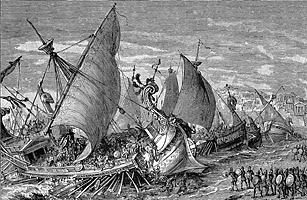
During the Peloponnesian Wars, the daring firebrand of Athens, Alcibiades, proposed a direct invasion of Syracuse, a powerful city on the island of Sicily. Nicias, an Athenian leader, opposed the expedition, and in an effort to kill the proposal asked for a force of unprecedented size, hoping the Athenians would be unwilling to foot the bill. It backfired; the Athenian assembly only became more gung-ho, and the well-equipped fleet set sail. After some initial success, Athens' archrival Sparta arrived with their own troops to support the Syracusans. Realizing that a siege of Syracuse was now futile, the Athenian fleet was ready to set sail for home. A lunar eclipse, however, frightened Nicias who, according to the great historian Thucydides, was "rather over-inclined to divination." Instead of returning to Athens, Nicias decided the fleet would stay for another 27 days to avoid the evil omen. Syracuse used the delay to attack the Athenians in the harbor. The massive Athenian fleet was trapped by a line of enemy ships, giving the great fleet little room to maneuver. The Syracusan ships used their advantage to ram the paralyzed ships head on. The result? As Thucydides wrote, the Athenian "losses were, as they say, total; army, navy, everything was destroyed, and, out of many, only a few returned."